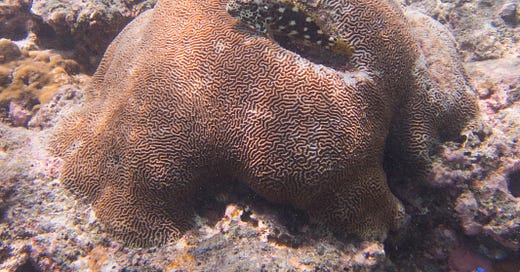Donna Harraway, author of the Cyborg Manifesto, once wanted to write a book called The Birth of the Kennel. That deceptively cutesy, tail-wagging title would have housed a bare-toothed, Foucauldean critique of humans’ tendency to tame the animal and to anthropomorphise nature (dogs, Harraway writes, ‘live in the domains of technobiopower’).
In techno these days, there’s an interesting sub-genre—which, in my forthcoming book, I’ve called biomorphic techno—using synthetic electronic sound to plunge into the weirdness of nature and of morphogenetic processes.
Biomorphic techno, whose artists include Rrose, Polygonia, Lucy and Pariah, not only uses sound as a microscope on nature’s weirdness; more, tracks like Pariah’s ‘Caterpillar’ or Mike Parker’s ‘Gunma Forest’ use nature’s weirdness as a microscope onto the human. Through sound, we return to union with the universe, sticky and viscid and molecular.
Polygonia is one of the artists leading this vision of techno. But her music does much else besides, with its myriad stylistic threads moving from jazz to contemporary classical to choral polyphony. I’ve been enjoying her EPs for the past couple of years, and a while back, ahead of her Berghain opening slot on 17 August, I interviewed her by email.
A lot of people associate techno with dystopian urban environments, postindustrial ruins, and so on. But in your music, on EPs like Living Patterns, the vision is of abundant nature and rich ecology. I'm interested in this vision. Is techno a way for you of thinking about nature—of showing listeners what's beyond industrialised society?
Each time I visit nature I feel that our society strongly moved away from the fundamental human connection to nature. As this makes me deeply sad, I see it as my mission to remind people of their roots. I see Techno as an empty canvas which one can fill with any thought or concept. As it’s so often linked to industrial contexts, it sticks out even more if this genre is approached in the opposite way. This makes it the perfect medium to spread the message of love and respect for nature. We are living in times in which this is one of the most important things to reflect about. How can we improve our lifestyle in order to reduce the harming effect we have on nature. I don’t like to spread words which can be misunderstood, so I prefer to speak through my music and have a (sub-)conscious effect on people’s thoughts and behaviour in favour of our planet.
There's a part in one of Carlos Casteneda's countercultural 1960s novels where he shrinks down to the size of a cell of water. Similarly, on tracks like 'Arachnida', I can hear insect voices and teeming undergrowths, as if your music involves an intense change of scale. To what degree do you consider your techno psychedelic?
I love psychedelic experiences as they have mind opening and healing effects. With my music I want to enable the listeners to reflect beyond their regular thoughts. Each time when people approach me after my sets and tell me that they tripped hard without any influence of substances, I feel that I reached one of my highest goals. My music should feel like living organisms. The complex structures of nature are extremely psychedelic to observe and understand, therefore it’s the perfect inspiration in order to create such experiences for my listeners.
What is the Otro Mundo your EP is named for?
Considering the current times, my heart feels very heavy. Too many wars, the mental separation of society in many countries and then the huge environmental crisis.
Sometimes I ask myself what happens afterwards and then I imagine another world either beyond death or the situation when we managed to survive and rebuild our lives in a new way. The title song ‘Otro Mundo’ translates my sentimental feelings about these things. It’s like a future love song to the times which will follow after all these terrible things finally finished. A small glimpse into paradise with heavy feelings. The whole EP describes the process of the mind going through the steps of fundamental change, while the last track ‘Twirling Membrane’ can be imagined as drum whirls which accompany these steps with huge excitement.
Final question: what is techno for you?
Techno is a movement. Techno stands for the fight for inclusion, it’s one of the musical languages which connects us to each other. Techno doesn’t know national borders. Techno is inspired by the colourful facets of different cultures and welcomes people from all over the world. Techno means freedom. Techno means creative exchange. Techno means letting go of worries and diving into (super-)natural fantasies. Techno means respect for each other.
*****
To those of you catching Polygonia’s Berghain opening set this weekend, enjoy. I’ll finish with some words by the novelist Ann Quin: ‘I am constantly amazed by the strangeness of natural things and the naturalness of strange things.’





really nice read, thank you!